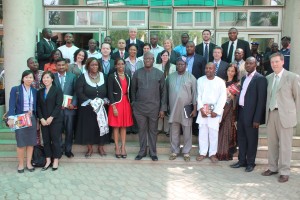 When the United Nations e-government survey for 2010 was released, Nigeria was nowhere on it. Also in 2012, Nigeria was again conspicuously missing on the list. This may not be unconnected with the secrecy and paranoia with which government business is conducted here. Even the much-hyped Freedom of Information Law, which has been more of a publicity stunt, has done nothing to eradicate the secrecy with which those we voted for conduct our affairs.
When the United Nations e-government survey for 2010 was released, Nigeria was nowhere on it. Also in 2012, Nigeria was again conspicuously missing on the list. This may not be unconnected with the secrecy and paranoia with which government business is conducted here. Even the much-hyped Freedom of Information Law, which has been more of a publicity stunt, has done nothing to eradicate the secrecy with which those we voted for conduct our affairs.
“The e-government development survey is an assessment of how governments use Information and Communication Technology (ICT) to provide access and inclusion for all.” As stated by the UN DESA (Department of Economic and Social Affairs) Under-Secretary, Sha Zukang: “The increasing role of e-government in promoting inclusive and participatory development has gone hand-in-hand with the growing demands for transparency and accountability in all regions of the world.” While this may be true in some places, Nigeria’s story is largely different as the country’s leaders always know how to teeter her to a path not trod by any other country.
So, while others move in a direction, Nigeria traditionally moves in another direction, not bothering for a second about catching up with the rest of the world, save for terrorism in which we are doing serious catching up through Boko Haram and Ansaru. Though most of the leaders mouth their desire to put the country on the path of progress, whatever they feel can hardly pass for desire. It is at best a psychopathic illusion.
It really then was (and still is) a breath of fresh air when I heard, though not unbelievably given the pedigree of the governor, that Ekiti State, which is the first in the country to domesticate the FOI Law, is embracing e-governance. IBM (US-based International Business Machines) was in the state for weeks to lay the groundwork.
According to the United Nations, e-government (or e-governance), also known as Digital Government, is “The employment of the internet and the world-wide-web for delivery of information and services to the citizens.” It is also “The utilisation of Information and Communication Technologies (ICT) and other web-based telecommunication technologies to improve and/or enhance on the efficiency and effectiveness of service delivery in the public sector.” (Jeong, 2007).
By embracing e-government and e-governance, the Ekiti State Government has distinguished itself as the beacon of hope amidst the darkness that seems to pervade the Nigerian horizon. By treading this path, the Ekiti State Government has shown that transparency is its maxim, as e-governance engenders transparency. It makes it easy for the public to be abreast of government policies, programmes and projects. This, in plain language, means that anyone with access to the internet needs no longer apply or make requests to get information about government activities as stipulated by the FOI Law. With just a click on his/her internet device, whatever information he/she requires is right there “Voila!” on the government’s syndicated website. This, to a large extent, will deal a blow to those who make it their duty to demonize every policy of government. It’ll also increase citizens’ involvement and participation in governance.
As is done in some countries, e-governance makes it possible for citizens to interact with political office holders via the internet. Rather than waste time visiting their offices, people can, in the comfort of their homes, easily make their views, even resentment, known to these representatives via the internet. This way, politicians get to regularly feel the pulse of their people. I don’t know if the Ekiti State Government would include this in its e-governance plan, but it would be nice if it does as this could make public servants become more effective and more efficient. Lawmakers, for instance, can, through this, know the leanings of their constituents on any issue and as a result how to vote in parliament.
The parlance around here is “We are waiting for oga’s approval.” With e-governance, ‘oga’ can approve from anywhere in the world. There is a software that allows for signing of documents online; it is called electronic signature (e-signature). This, in effect, means that Governor Kayode Fayemi can be in the US or anywhere in the world and still signs documents for onward implementation back in his state, Ekiti. Subordinates no longer have to wait till ‘oga’ comes back to take action on any issue. This will ensure speed, efficiency and convenience
While I commend the Kayode Fayemi administration for setting itself apart from the “rice and dodo” politics and governance around here, I’ll like to urge it to ensure that the e-governance innovation comes to fruition. If Nigeria is back-pedalling, there is no reason Ekiti cannot show the way. The opposition, as is their tradition, will jab, kick, twist and writhe, this should not deter the Ekiti State Government from seeing it through.
However, in this age of cyber-terrorism, the State Government should have an impregnable firewall to protect the network. There should also be a back-up system that allows government to continue to run unhindered should there be attacks on the network
By Dimeji Daniels
This article was first published in the Daily Independent
Last modified: April 4, 2013
